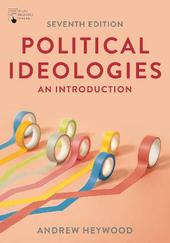
|
Political Ideologies: An Introduction
Paperback / softback
Main Details
| Title |
Political Ideologies: An Introduction
|
| Authors and Contributors |
By (author) Andrew Heywood
|
| Physical Properties |
| Format:Paperback / softback | | Pages:308 | | Dimensions(mm): Height 240,Width 168 |
|
| ISBN/Barcode |
9781352011838
|
| Classifications | Dewey:320.5 |
|---|
| Audience | |
|---|
| Edition |
7th edition
|
|
Publishing Details |
| Publisher |
Bloomsbury Publishing PLC
|
| Imprint |
Bloomsbury Academic
|
| Publication Date |
6 April 2021 |
| Publication Country |
United Kingdom
|
Description
Offering an unparalleled, sweeping survey of the political ideologies that have shaped our world, the seventh edition of Andrew Heywood's seminal undergraduate textbook continues to lead the way in guiding students through the political creeds and doctrines that have dominated politics past and present. Covering an impressive array of topics, the first half of the book focusses on traditional ideologies such as Conservatism, Socialism, Liberalism, Anarchism and Fascism, while more contemporary movements such as Populism, Feminism, Green Ideology, Multiculturalism and Religious Fundamentalism form the latter part of the text. Taking into account the remarkable events that have shaken the political sphere in recent years, the text has been revised and updated throughout in order to show how the study of political ideologies can elucidate the significance of such striking phenomena as the decline of liberal democracy and the rise of populist movements and authoritarianism around the world. The most accessible, concise and yet comprehensive introduction to the topic, this is an indispensable textbook for students studying for courses on political ideologies, political theory and introductory politics. It should be essential reading for anyone seeking to gain an understanding of political ideologies for the first time. New to this Edition: - A brand new chapter on Populism addressing the rise of populist movements across the world and the related decline of liberal democratic values - More on sexualities, queer politics and trans issues in the chapter on Feminism; and a wider range of religions considered in the chapter on Religious Fundamentalism - New Key Thinker boxes featuring a more diverse array of voices - A fully revised concluding chapter on 'Why Political Ideologies Matter' - Updated Political Ideologies in Action boxes reflecting on recent, major political events and their significant for political analysis - A completely refreshed companion website comprising a testbank, PowerPoint slides, flashcard glossary, additional 'Political Ideologies in Action' cases, and interactive simulations Accompanying online resources for this title can be found at bloomsburyonlineresources.com/political-ideologies-7e. These resources are designed to support teaching and learning when using this textbook and are available at no extra cost.
Author Biography
Andrew Heywood is author of such best-selling textbooks as Politics, Political Ideologies and Global Politics, used by hundreds of thousands of students around the world. Andrew was vice principal of Croydon College, having previously been director of studies at Orpington College and head of politics at Farnborough Sixth-Form College.
ReviewsEvery summer, I teach a course on politics and popular culture and assign Andrew Heywood's Political Ideologies. The book provides a clear introduction to the 'isms' that shape how most of us think about politics, including, in the new edition, populism. The book hits the sweet spot of being accessible to newcomers and illuminating for more advanced students. * Nicholas Tampio, Fordham University, USA * This brand-new edition of Andrew Heywood's Political Ideologies reflects the challenges and developments of our times: it includes a chapter on Populism, a Feminism chapter comprising intersectionality, trans theory and queer theory, an in-depth analysis of postcolonialism, case studies on contemporary issues and a discussion about the future prospects of each ideology. An indispensable tool for learning and teaching. * Andrea Schapper, University of Stirling, UK * A rare book which helps teachers not only inform but also inspire students to discover their place among competing ideologies. Heywood's orderly presentation provides readers with excellent access to a wide range of ideological identities. * John Uhr, Australian National University, Australia * Political Ideologies represents an excellent resource that continues to be of interest to both staff and students. Heywood sets out and develops a clear understanding of the ideologies that continue to shape contemporary politics and society. * Michael Kyriacou, University of East Anglia, UK * Political ideologies reflects considerable scholarship but communicates this in a clear and accessible way. The format, including tables and boxes that compare ideologies, is exceptionally reader friendly. The tracking of the evolution of ideologies is particularly good, and helps students (and others!) make sense of the bewildering forest of labels that litter the political landscape today. This is a book students will actually read! * Jennifer Leigh Bailey, Norwegian University of Science and Technology, Norway * Andrew Heywood's book remains one of the best introductions to the study of political ideologies. Its main strength lies in the author's ability to explain complex ideas in an engaging and accessible way, while the 'Political Ideologies in Action' features encourage the reader to reflect on the relationship between political ideas and contemporary issues. * Judi Atkins, Aston University, UK * This book is essential reading as a core text in political ideologies. It explores in detail the origins, key concepts, variants and tensions within ideologies, and this new edition provides even more extensive consideration of the most recent developments in ideology such as populism and trans and queer theory. A key attractive feature is the way the book relates ideology to current themes such as decolonising the curriculum; nationalism and the pandemic, anarchism and cyberspace. In short, this is a well written, comprehensive, up-to-date and above all stimulating text. * Paul Flenley, University of Portsmouth, UK *
|